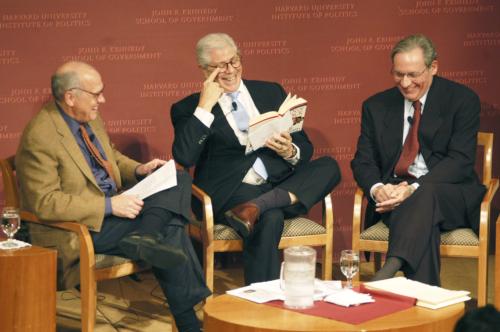Carl Bernstein and Bob Woodward, the reporting duo best known for their successful pursuit of the Watergate story in the 1970s, discussed anonymous sources and the differing ways that journalists can view their role to a full forum at the Institute of Politics yesterday.
“My inclination is not to make a judgment, because too often my judgment has been wrong,” said Woodward, who is known for a straightforward writing style that steers clear of editorializing.
“And I think sometimes you have to be a little more explicit,” replied Bernstein, whose writing is often more pointed. “We have different methodologies.”
Bernstein was openly critical of the Bush administration during the event, which was co-sponsored by the Shorenstein Center on the Press, Politics, and Public Policy.
Bernstein said that he was “wrong” to discredit talk of President Bush being less intelligent than other presidents, and spoke of a White House “cover-up” in the wake of the Iraq war.
Woodward—who said that he was not going to associate himself with Bernstein’s judgments—said that in his view, it was important to present the facts without trying to mix them with opinions.
“I want to explain simply what happened,” he said.
As an example, Woodward referred to a section in his book, “Plan of Attack,” in which he described Bush telling numerous advisors—including Vice President Dick B. Cheney and former Secretary of State Colin L. Powell—about his decision to invade Iraq.
But Woodward said that weeks later, Bush told the nation that he had not yet made a firm decision.
“[I] don’t say, ‘guilty, guilty, guilty, liar, liar, liar,’ but the message is conveyed,” Woodward said in regards to his book about the lead-up to the war.
In an editorial published in Sunday’s New York Times, columnist Frank Rich criticized Woodward for failing to discuss an alleged White House disinformation campaign in the book, which was based on numerous unnamed sources within the Bush administration.
“Frank is my friend, and I think he is 100 percent off base here,” said Bernstein, who added that “Plan of Attack” has served as the foundation for much of the discussion about the war.
“I don’t think he read the book very carefully....[Rich] didn’t call me, and I would have been happy to answer his questions,” Woodward said.
When discussing the stated premise of the event—anonymous sources—both Woodward and Bernstein were insistent that identities must always be protected, provided that sources did not lie to a reporter.
“I think it’s an absolute contract,” said Woodward. “Those sources are our lifeline.”
In the wake of the recent investigation by special prosecutor Patrick J. Fitzgerald into the leak of an undercover CIA operative’s name to the press, Woodward and Bernstein both said they were worried about the effect of similar cases on journalists’ ability to do their job.
Fitzgerald sent New York Times reporter Judith Miller to jail for refusing to testify in front of a federal grand jury regarding an anonymous source.
She eventually testified along with a number of other reporters, including Woodward.
“I, like Carl, am very concerned about prosecutors going after reporters and their sources,” said Woodward. Such action “will dry up the real story of what’s going on in government.”
The two reporters also discussed the case of W. Mark Felt, a former top official at the FBI.
During the Watergate affair, Felt was the unnamed source known as “Deep Throat” for Woodward and Bernstein’s reporting, providing them with information under the understanding that his identity would not be revealed until his death.
But Felt’s family and lawyer revealed Felt’s involvement in an article in Vanity Fair earlier this year, and Bernstein said, “It was apparent to us that we would have no credibility if we didn’t confirm it.”
“To this day, I think its a sad situation because I don’t know how much Mark Felt participated in that decision” to reveal his identity, Bernstein added.
Felt was 91 when his identity was revealed in May, and some have questioned his mental state.
—Staff writer Evan H. Jacobs can be reached at ehjacobs@fas.harvard.edu.
CLARIFICATION: The print and original online version of this story stated that New York Times reporter Judith Miller was sent to jail for refusing to identify an anonymous source. In fact, she was imprisoned after refusing to testify in front of a federal grand jury regarding her source.
Multimedia
Read more in News
HUDS Seeks Truth in Waffle-Making














